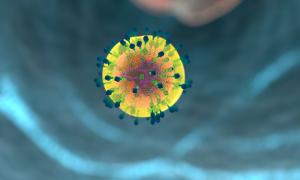IrsiCaixa confirms that cell-mediated immunity protects against COVID-19 severity in the absence of antibodies

People who have not produced antibodies against SARS-CoV-2 despite mild to moderate COVID-19 can fight the virus through cell-mediated immunity, which is driven by T-cell function.
Between 2 and 17% of people who pass COVID-19 do not generate antibodies despite having been infected by SARS-CoV-2. To understand how these people fight the virus, the IrsiCaixa AIDS Research Institute –a center jointly promoted by the "la Caixa" Foundation and the Department of Health of the Generalitat de Catalunya– has compared the immune response of people who overcome COVID-19 with the help of antibodies with that of those who pass the disease without producing antibodies. Thanks to the samples collected at the Germans Trias i Pujol Hospital, the Institute has been able to demonstrate that, in this second context, the T cells of the immune system are very effective, since few are sufficient to prevent the severity of the disease and, in addition, they are able to recognize proteins from both outside and inside the virus. The article, published at the Frontiers in Immunology journal, identifies characteristics of T cells that will help to detect and track cell-mediated immunity against SARS-CoV-2. The results highlight the high importance of this type of immunity in combating COVID-19 and will also serve as a guide for inclusion in the design of future vaccines.
Both cell-mediated and humoral immunity are highly specific responses against pathogens, led by T cells and antibodies, respectively. In the case of COVID-19, however, it is most common to assess the patient's immune response based on their antibodies, rather than on the basis of the cellular response. "This can generate confusion in people who are not found to have antibodies against SARS-CoV-2 despite having been vaccinated or having passed COVID-19," explains Julia Garcia-Prado, principal investigator at IrsiCaixa and scientific director of the Germans Trias i Pujol Research Institute (IGTP). "Thanks to this study we can say that these people are able to protect themselves from the severity of the disease without the need for antibodies", she adds.
High quality of cellular response
In order to carry out the study, samples from a group of patients who have passed COVID-19 with different degrees of severity and that, in all cases, the infection has been confirmed by a positive result of the PCR test, have been used. Within this group, the cellular response of 31 persons with antibodies and 16 persons who did not generate antibodies either during the acute infection or months later was analyzed. By comparing them, the research team has observed that both profiles of people have a cellular response capable of detecting SARS-CoV-2 infected cells. However, in the absence of antibodies, a greater number of cells capable of recognizing different parts of the virus, specifically the spike protein and the nucleocapsid, were observed.
The body has reserve T cells that, when they come into contact with the virus, go through a maturation process that allows them to detect and kill infected cells. "In people without antibodies against SARS-CoV-2, we see fewer mature cells", explains Athina Kilpeläinen, postdoctoral researcher at IrsiCaixa and first author of the paper. "It seems that these people would need few cells to fight the virus. We could say that, in this case, the quality of the immune response comes before quantity", she adds.
This rapid and effective response would allow the immune system to quickly return to a resting state. "If the body remains permanently in a state of alarm, the immune system can become exhausted and can lead to excess inflammation that is harmful to the patient, as we observed in cases of people hospitalized with COVID-19", Kilpeläinen explains. In this regard, the study suggests that this rapid and controlled cellular response could be due to the immune memory generated against old infections caused by viruses similar to SARS-CoV-2, such as the common cold.
Inclusion of cell-mediated immunity in the design of new therapies against COVID-19
This study evidences the role of cell-mediated immunity in protection against COVID-19 and, therefore, the importance of considering this branch of immunology when designing vaccines and immunotherapies. "The results are essential for developing clinical tools for monitoring cell-mediated immunity in people who do not generate antibodies despite having passed the infection or been vaccinated. They also help us to identify essential components to consider for a second generation of vaccines against SARS-CoV-2", remarked García-Prado.
A remarkable feature of cell-mediated immunity is that it targets any of the virus proteins, including those within SARS-CoV-2. "The internal proteins vary less and this underscores the usefulness of cell-mediated immunity in controlling new variants of SARS-CoV-2", concludes García-Prado.